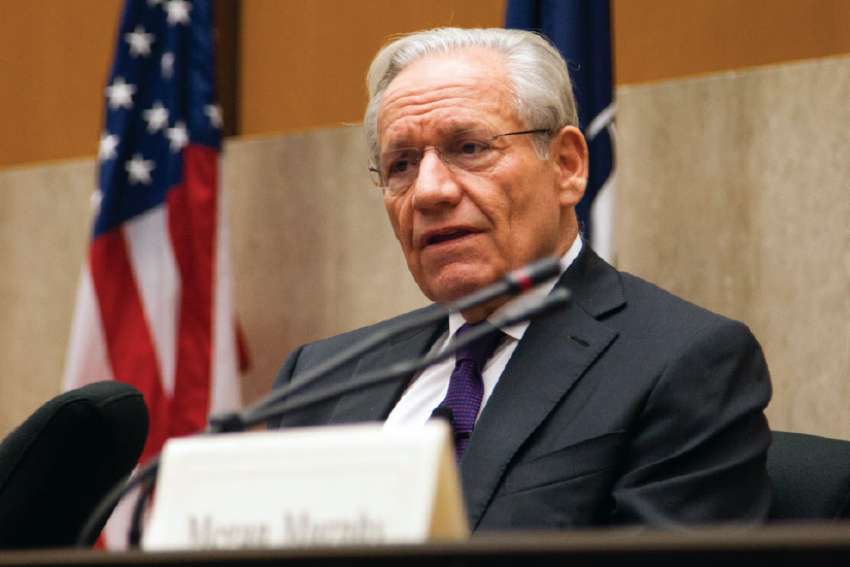It was a note of congratulations on the groundbreaking investigative journalism performed by Bob Woodward and Carl Bernstein, Woodward told a sold-out crowd at the Mississauga Living Arts Centre on Jan. 17.
Now age 75, the renowned and world famous Woodward said there was also a simple message in the letter that stuck with him his entire life: “Beware the demon pomposity,” Graham warned them.
Woodward was in town to talk about his latest book, Fear, a runaway best-seller of more than two million copies (and counting) about U.S. President Donald Trump. Clearly, no one ever gave Trump similar advice or, if someone did, Trump ignored it.
Woodward’s two-hour talk with TVO’s Agenda host Steve Paikin was intriguing in many ways, not least of which was what it was not. It was not a full-on barrage or personal attack against Trump.
Sure, there were stories about the president of the United States watching six to eight hours of television per day — as if he didn’t have more important things to do. There were behind-the-scene tales of Trump belittling, insulting and demeaning underlings, his threats upon the U.S. Constitution and rolling the dice on nuclear war, and Trump’s lies — 7,400 since taking the oath of office, according to the tracking by the Washington Post, Woodward said.
But the evening included other stories and messages from Woodward about “finding a path” to common ground and getting beyond these “precarious” and “dicey times.”
He said we need more “even emotion” and less narrow-mindedness, especially in media but also with all politicians and citizens. Whether you’re a Trump-hater or a Trump-lover, we’ve got to open our minds to at least see things from the other’s perspective and listen without always shouting back.
Here is a man with almost 50 years of journalism experience and with the perspective of someone who has personally known and written about nine presidents.
Woodward told a story about a Sunday morning in September 1974, one month after Nixon’s resignation. He was awakened by his telephone and then hearing Bernstein yell into the receiver: “The son-of-a-bitch pardoned the son-of-a-bitch.”
Woodward and Bernstein (and many others) were absolutely convinced there was a deal where Nixon would resign if his successor Gerald Ford issued a presidential pardon. For years, Ford didn’t fully reveal the reasons for the pardon. In 1976, Ford lost the White House to Jimmy Carter in a very close election. Many historians believe the pardon contributed significantly to his defeat.
Then 25 years after the pardon, Woodward was working on his book called Shadow: Five Presidents and the Legacy of Watergate. He had a series of interviews with Ford at his home in Rancho Mirage, Calif. During each meeting, Woodward would ask about the pardon and Ford kept answering there was no deal, but with few other details.
Finally, during the seventh interview Ford said he was going to tell him something “I haven’t even told Betty” (his wife), Woodward quoted Ford.
Ford acknowledged that Nixon’s chief-of-staff Alexander Haig came to him the day before the resignation and said the president would resign if he’d agree to pardon Nixon.
“Aha,” Woodward exclaimed to the laughing crowd in Mississauga, “I finally got the truth.”
Returning to the story, Woodward said Ford then added pieces. He said he knew Nixon was done and had to leave office. Ford didn’t need to make a deal and didn’t. Then, during the days and weeks that followed, new revelations from the special prosecutor emerged and the country remained consumed by Watergate. If Nixon were charged, with a trial and appeals, it could take years to get past Watergate, Ford told Woodward.
“The country needed to move forward” and that’s why Ford decided to pardon Nixon, not because he had to under a deal, Woodward said.
At the time, Ford had a hunch the pardon would damage his political career and ultimately cost him the presidency, but he put the country ahead of everything else.
Shortly after Shadow was published, Ford was given The John F. Kennedy Profile in Courage Award in 2001. The award recognizes a public official (or officials) at the federal, state or local level whose actions demonstrate the qualities of politically courageous leadership.
The point of the story is that we shouldn’t assume things without knowing the entire story. Then Woodward said the “ultimate tragedy” of Trump is that he doesn’t appear to put what’s good for America and Americans first.
But who knows, maybe something good will emerge in the next 25 years about today’s White House that is described in Fear as “a zoo without walls.”
(Brehl is a writer and author of many books.)


